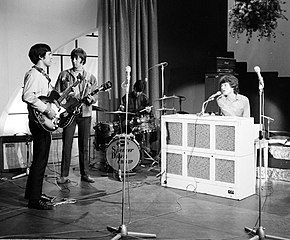
Here is some news for old fogey music lovers (like me). Remember the Spencer Davis Group? Stevie Winwood was the sixteen year old lead singer belting out hits like “Gimme Some Lovin’.” In 1966, the song reached the number 2 hit single position in the U.S. According to Muff Winwood, the bassist, it was “conceived, arranged, and rehearsed in just half an hour.” Muff is quoted as saying
We started to mess about with riffs, and it must have been eleven o’clock in the morning. We hadn’t been there half an hour, and this idea just came. We thought, bloody hell, this sounds really good. We fitted it all together and by about twelve o’clock, we had the whole song.
Perhaps, the most recognizable part of the song is, indeed, the bass riff.
Give a listen:
It turns out that earlier in 1966, Willia Dean Parker and Homer Banks, wrote a tune called “Ain’t That a Lot of Love.” Now, no one remembers that song because it was never a hit.
Here is Taj Majal’s rendition of Willia Dean Parker’s and Homer Banks’ tune:
If you notice the similarity of the bass riffs, you’re not alone. No wonder Gimme Some Lovin’ was composed in half an hour. But it took Willia Dean Parker more than 50 years to sue Steve Winwood, his brother Mervyn Winwood, and Kobalt Music Publishing (owner of the rights to Gimme Some Lovin’) for copyright infringement. The case, Willia Dean Parker and Rose Banks v. Mervyn Winwood, Steve Winwood, and Kobalt Music Publishing, originally filed in the Federal District Court for the Middle District of Tennessee, is an unremarkable infringement case but serves to demonstrate that you shouldn’t wait 50 years before suing because the evidence you can muster is likely faded.
The District Court dismissed the case for plaintiff’s’ failure to submit admissible evidence showing that Steve Winwood copied plaintiff’s’ work. It also found that the court lacked personal jurisdiction over Mervyn Winwood because he resides in the United Kingdom with no contacts to the United States or Tennessee. Plaintiffs appealed to the United States Court of Appeals for the Sixth Circuit.
The Sixth Circuit affirmed the decision of the District Court. Plaintiffs’ evidence was primarily faded documents and hearsay website screen captures, which referred to various interviews in which Spencer Davis allegedly admitted to copying the base riff from “Ain’t That A Lot Of Love”. The court reviewed the hearsay rule and its exceptions and determined that the evidence was not admissible. Likewise, it affirmed the dismissal of Mervyn Winwood from the case.
Notably, the court also refused to consider whether the two songs were strikingly similar based upon an an expert opinion that was submitted by plaintiffs after completion of the summary judgment briefings and hence not preserved for appeal. Interestingly, Judge Donald in her lone dissent, denounced the majority’s refusal to consider the expert report:
we “will consider an issue not raised below when the proper resolution is beyond doubt or a plain miscarriage of justice might otherwise result.” .. These exceptional circumstances are rare, but they do occur. Because the expert report points to a genuine issue of material fact, this is one of those circumstances.
…
The expert report concludes that “the two works exhibit a clear and unmistakable overall similarity of sound . . . primarily due to the fact that the two works prominently feature identical bass lines, nearly identical piano patterns, and similar harmonic, melodic, and lyrical materials.” Notably, the identical base lines and nearly identical piano patterns “constitute clear and obvious similarly between the two works,” and are referenced more than once in the report.
…
These conclusions indicate that the two songs are strikingly similar. Notwithstanding the expert report, anyone with a listening ear, including a jury, could reasonably conclude that the two songs contain a strikingly similar musical composition.
She’s right! Just listen to the links at the top of the article. But alas, dissents are not the law.
— Adam G. Garson, Esq.

